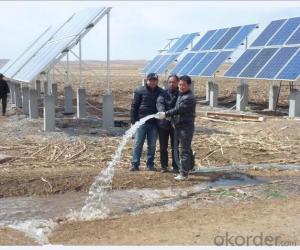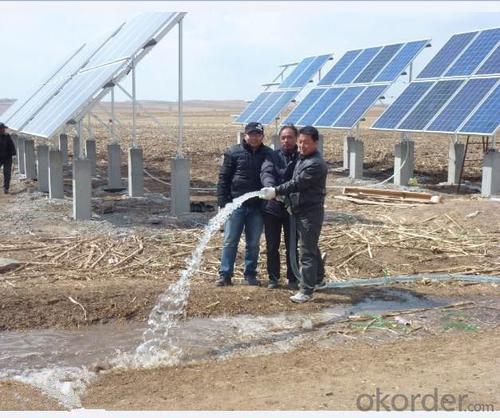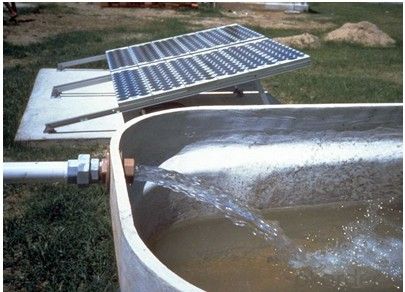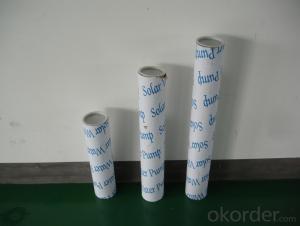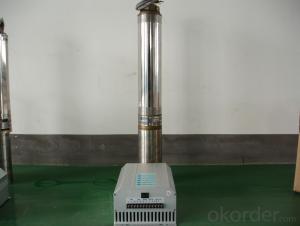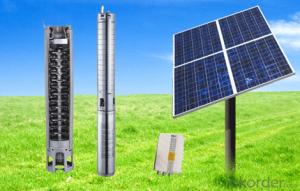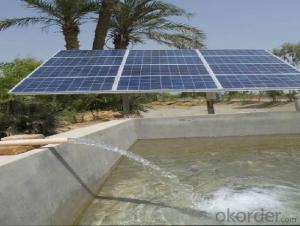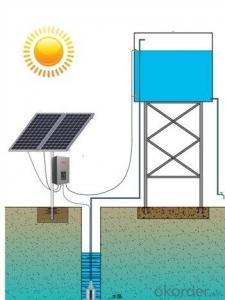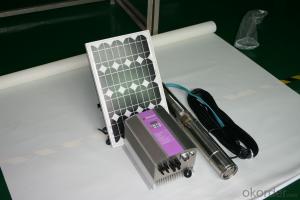12V Solar Water Pump DIY Solar Water Heater for Small Fountain
- Loading Port:
- Shanghai
- Payment Terms:
- TT OR LC
- Min Order Qty:
- 1 set
- Supply Capability:
- 1000 set/month
OKorder Service Pledge
OKorder Financial Service
You Might Also Like
12V Solar Water Pump Diy Solar Water Heater
Feature
High Efficiency & High Reliability
DC Brushless Permanent Magnet Motor
Minimum Maintenance, long Service Life
Environment Friendly Materials, Lubricated Without Oil
Application
Village or Family Water Supply
Animal Drinking Water & Livestock Watering
Garden/Courtyard Irrigation
Swimming Pool
Water Supply for Bivouac or Camping Car
Water Supply for Remote Area
Automatic Control
Operate Automatically, No Need Watching
Maximum Power Point Tracking (MPPT)
Dry-run Protection
Advanced Technology
Applications Innovation
The efficiency of DC brushless permanent magnet motor has been increased up to 25% in comparison with traditional asynchronous motor.
Technology Innovation
Stator and rotor are sealed by environment friendly casting resin.Motor insulation resistance can be hold higher than 300MΩfor more than 10 years, which consumedly increased the security and reliability of the submersible motor.
Structure Innovation
Casting resign technology processed stator and rotor as well as the water lubricated bearing make the submersible pump environment friendly.
Outlet: Stainless steel
Pump body: Stainless steel
Motor body: Stainless steel
Impeller: Stainless steel
Features:
Water filled motor
Max. Head: 90m
Max. Immersion Depth: 200m
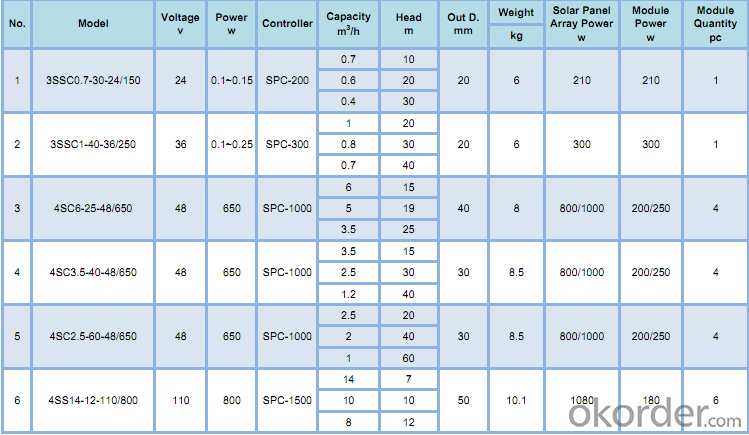
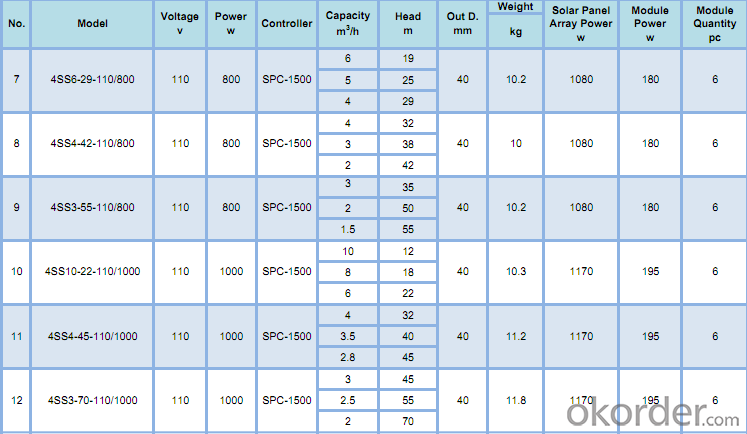
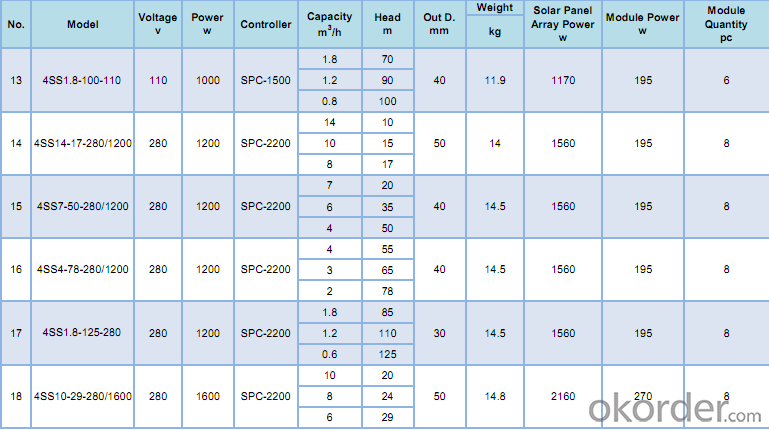
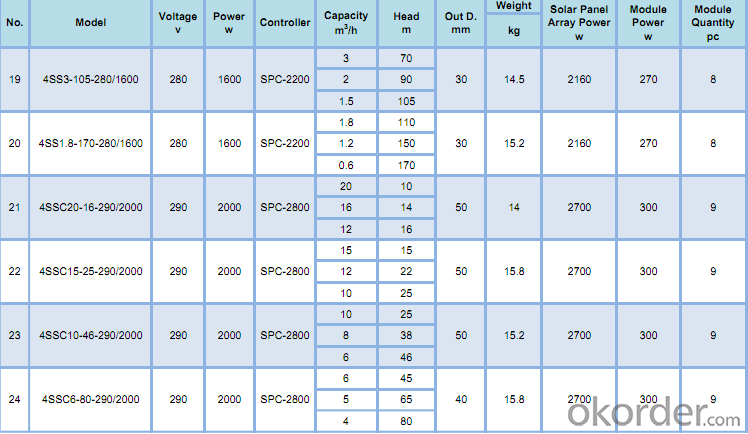
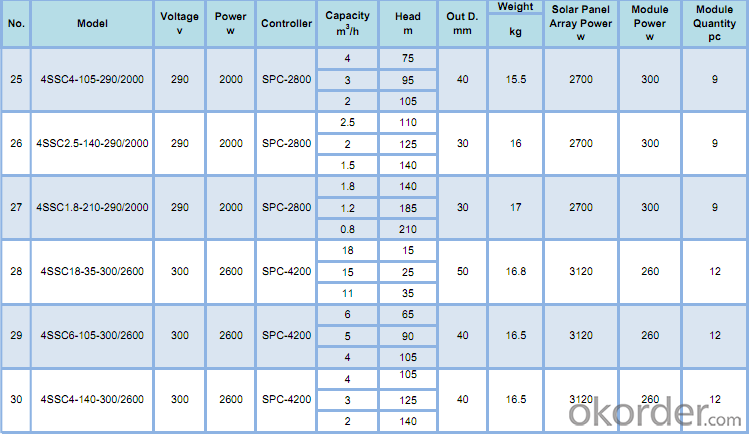
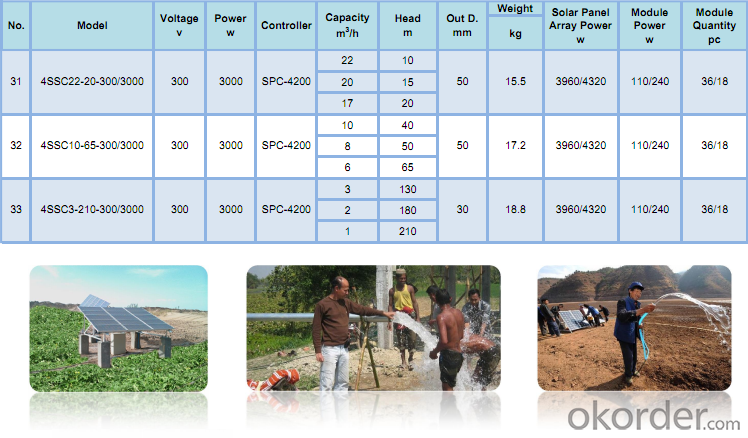
- Q: How does the size of the solar pump system affect the performance and cost?
- The size of the solar pump system directly affects its performance and cost. A larger system with a higher capacity can pump water more efficiently, resulting in better performance. However, a larger system also means higher initial costs for equipment and installation. On the other hand, a smaller system may be more affordable upfront but might not meet the desired water pumping requirements. Therefore, it is crucial to carefully consider the required performance and budget constraints when determining the size of a solar pump system.
- Q: Can a solar pump be used in off-grid homes?
- Yes, a solar pump can be used in off-grid homes. Solar pumps are an excellent option for off-grid living as they rely on solar energy to operate, eliminating the need for grid electricity. They can be used to pump water for various purposes such as irrigation, drinking water, or livestock. Solar pumps are cost-effective, environmentally friendly, and provide a reliable source of water in remote areas where access to electricity is limited or unavailable.
- Q: What are the different types of solar pumps?
- There are primarily three types of solar pumps: submersible solar pumps, surface solar pumps, and floating solar pumps. Submersible solar pumps are installed underwater and are commonly used for deep well water extraction. Surface solar pumps are placed above ground and are suitable for shallow water sources such as ponds or rivers. Floating solar pumps are designed to float on the surface of water bodies and are often used for irrigation or water circulation purposes.
- Q: What is the maximum pumping depth of a solar pump?
- The maximum pumping depth of a solar pump depends on various factors such as the power and efficiency of the pump, the quality and capacity of the solar panels, and the distance between the pump and the water source. However, in general, solar pumps can typically pump water from depths ranging between 50 to 500 feet.
- Q: Are there any limitations on the water quality or purity requirements for a solar pump?
- Yes, there are limitations on the water quality or purity requirements for a solar pump. The water should be free from excessive levels of contaminants such as sediments, chemicals, or heavy metals, as these can damage the pump components or reduce its efficiency. It is important to ensure that the water source meets the recommended quality standards to ensure optimal performance and longevity of the solar pump.
- Q: Can a solar pump be used for water supply in agricultural greenhouses?
- Yes, a solar pump can be used for water supply in agricultural greenhouses. Solar pumps are an efficient and sustainable solution for providing water to plants in greenhouses. They utilize solar energy to power the pump, eliminating the need for electricity or fuel. This makes them cost-effective and environmentally friendly. Solar pumps can be easily installed and require minimal maintenance, making them a suitable choice for agricultural greenhouse water supply.
- Q: How does the angle of the solar panel affect the performance of a solar pump?
- The angle of the solar panel directly affects the performance of a solar pump. The ideal angle of the solar panel should be set to maximize the amount of sunlight hitting the panel's surface. If the angle is too steep or too shallow, the efficiency of the solar pump may be compromised. An optimal angle ensures that the solar panel receives maximum sunlight, allowing it to generate more electricity and thereby increasing the performance of the solar pump.
- Q: Can a solar pump be used in a well?
- Indeed, a well can indeed utilize a solar pump. These pumps are specifically engineered to function solely on solar energy, rendering them an exceptional alternative for areas distant from conventional power supplies. By employing solar panels to transform sunlight into electrical power, the pump can effectively extract water from the well. Due to their low maintenance requirements, affordability, and eco-friendliness, solar pumps have become a favored choice among well owners seeking a dependable and sustainable water pumping solution.
- Q: Are there any limitations to the flow rate of water a solar pump can handle?
- Indeed, there exist restrictions on the water flow rate that can be handled by a solar pump. Typically, the flow rate of a solar pump is determined by factors such as the pump's size, capacity, and the amount of sunlight available to power it. The maximum flow rate of the pump depends on its size and capacity. If the pump is undersized or possesses limited capacity, it may struggle to manage high water flow rates. In such instances, the pump may face difficulties in delivering water efficiently or may fail altogether in pumping water. Furthermore, the flow rate of the solar pump can also be influenced by the amount of sunlight accessible for powering it. Solar pumps rely on solar panels to convert sunlight into electricity, which is then utilized to operate the pump. Inadequate sunlight or improper positioning and maintenance of the solar panels can result in insufficient power supply to the pump, hindering it from operating at its maximum flow rate. It is worth mentioning that the flow rate of a solar pump may fluctuate based on the time of day and weather conditions. For instance, on cloudy days or during the early morning or late afternoon when the sun's intensity is diminished, the flow rate may decrease. Thus, although solar pumps offer a sustainable and environmentally friendly solution for water pumping, they do have limitations regarding flow rate. It is crucial to thoughtfully consider the pump's size, capacity, and ensure proper maintenance of the solar panels to optimize the water flow rate.
- Q: Are solar pumps noisy during operation?
- No, solar pumps are not noisy during operation. They usually operate silently, making them ideal for both residential and commercial settings.
Send your message to us
12V Solar Water Pump DIY Solar Water Heater for Small Fountain
- Loading Port:
- Shanghai
- Payment Terms:
- TT OR LC
- Min Order Qty:
- 1 set
- Supply Capability:
- 1000 set/month
OKorder Service Pledge
OKorder Financial Service
Similar products
Hot products
Hot Searches
Related keywords
